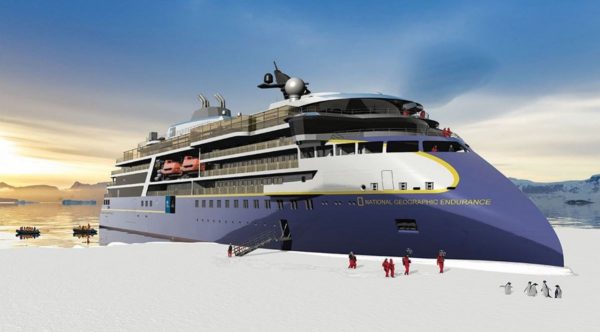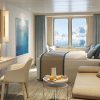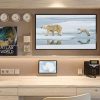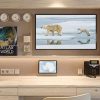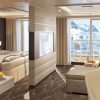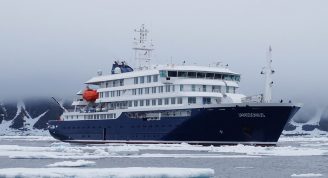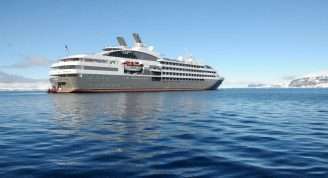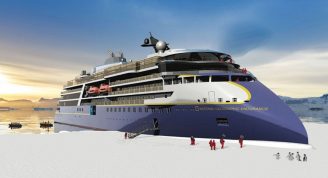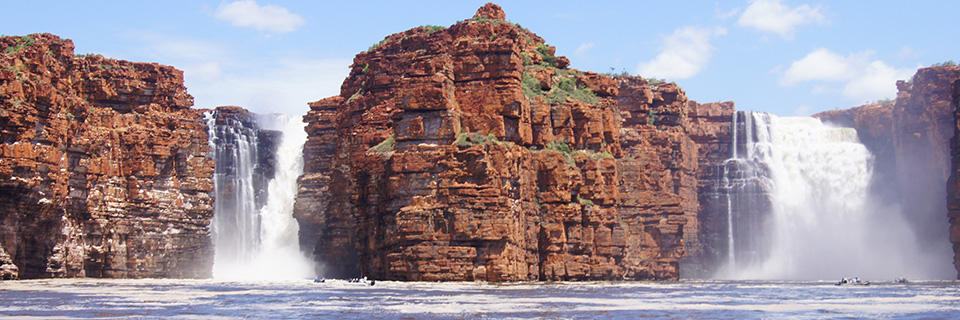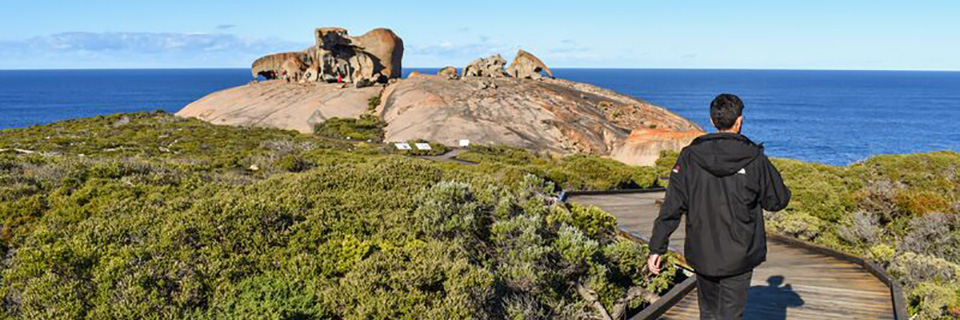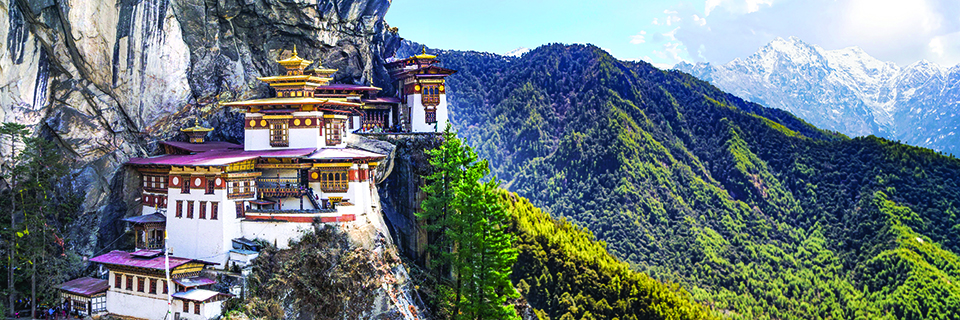Description
Travel aboard the new National Geographic Endurance to the rarely visited shores and isles of the South Atlantic—places of stunning beauty that harbor a mesmerizing array of marine creatures. Enjoy a unique opportunity to experience Argentina’s rugged—and lesser-explored—eastern coast, seeking out secluded ports, wildlife-rich estuaries, and the whale-rich waters of UNESCO World Heritage-listed Península Valdés. Hike the rocky shores and atmospheric moors of the Falkland Islands among fur seals and the world’s largest colony of black-browed albatross. Then get immersed in a sea of black and white amid tens of thousands of king penguins on a remote beach in South Georgia.
Trip Name
Wild Coasts of Argentina, South Georgia and the Falklands
Days
22
Overview
Vessel Type: Expedition Ship
Passenger Capacity: 126
Built: 2020
A next-generation expedition ship, purpose-built for polar navigation.
National Geographic Endurance is a next-generation expedition ship, purpose-built for polar navigation. A fully stabilized, highly strengthened, ice-class Polar Code PC5 (Category A) vessel, it is designed to navigate polar passages year-round, and safely explore unchartered waters, while providing exceptional comfort. Its patented X-BOW® is key to its design; its powerful wave-slicing action provides an extremely smooth ride in even adverse conditions, and even reduces spray on deck, for superior observation. She carries a full suite of expedition tools and offers a variety of experience-enhancing amenities.
The luxury of comfort on expedition
National Geographic Endurance comfortably accommodates 126 guests in 69 outside-facing cabins. Cabins are efficiently designed, with sizes range from the 140-square-foot solo cabin to the 430-square-foot category 7 suite. Fifty-three of the 69 cabins, including all 12 of the solo cabins, will feature small balconies with floor-to-ceiling sliding doors that bring in the spectacular views and ample natural light.
Comfort & convenience in every room
Every cabin has two portholes, a large window or balcony, and temperature controls. Bathrooms are modern and stocked with botanically inspired hair products, soap, and shower gel, plus a hairdryer. Cabins are equipped with expedition command centers with tablets and USB/mobile device docking, TVs, Wi-Fi connections, and hair dryers.
Dining: Food served aboard is fresh, local, and delicious, and sourced from suppliers who share our values of sustainable use whenever possible. Meals aboard are almost always served in the dining room, located aft of the lounge deck. When weather conditions allow, lighter fare may be served on the observation deck. There is no assigned seating and our dining room accommodates the entire expedition community in a single seating. During meals your expedition leader, naturalists, and any guest speakers aboard will join you.
Public Areas: Two restaurants, a Chef’s Table for small group dining, Observation Lounge with bar, gym, Wellness area, infinity-style outdoor hot tubs, library, main lounge with full service bar, 24-hour beverage, state-of-the-art facilities for films, slideshows and presentations, and a photo workshop area; plus, an expedition base with lockers for expedition gear, and an “open bridge” for access to our captain, officers and the art of navigation.
Meals: Two restaurants, featuring local, sustainable choices and unassigned seating for flexible, inclusive dining; plus a Chef’s table for intimate, small group dining. Main restaurant has 270º views, and the Observation deck restaurant features lighter, made-to-order fare.
Cabins: All cabins face outside with large windows, private facilities and climate controls. 53 cabins have balconies. Cabins are equipped with expedition command centers with tablets and USB/mobile device docking, TVs, Wi-Fi connections, and hair dryers.
Expedition Tools: Zodiac landing craft, kayaks, snowshoes, cross-country skis, undersea specialist operating a remotely Operated Vehicle (ROV) and underwater video camera for unique access to polar marine world, hydrophone, aerial remote-controlled camera and video microscope.
Special Features: A full-time doctor, undersea specialist, National Geographic photographer, Lindblad-National Geographic certified photo instructor and video chronicler, an internet cafe and laundry.
Wellness: The vessel is staffed by our wellness specialists and features a glass-enclosed yoga studio, gym, treatment rooms and spa relax area, and high- and low-heat saunas with ocean views.
Expedition Landing Craft: Key to our operation is our fleet of expedition landing craft, which we use to land in places that would otherwise be inaccessible. With 8 of these boats and two loading stations used every time we disembark, we’re able to transfer guests off the ship quickly, so you can be out on adventures, not idly waiting. The expedition landing craft we use are 19 feet long, powered by four-stroke outboard engines, and are capable of comfortably carrying 10-12 people. They are widely recognized as the safest and most versatile small boats afloat.
Remotely Operated Vehicle: Capable of reaching 1,000 feet, far beyond the range of any Scuba diver, the ROV allows you to literally view parts of the undersea that are as unexplored as the moon. Chances are you, like many of our guests, will be struck by how surprisingly colorful undersea life is in these unlikely places. And this glimpse may fundamentally change how you view the ocean.
Kayaks: National Geographic Endurance will be equipped with a fleet of kayaks large enough to ensure everyone who wants to can paddle at every opportunity.
Consequently, prior kayaking experience isn’t necessary—many of our guests have their first kayaking experience in extraordinary locations. Our custom-designed floating platform lets us deploy kayaks from the ship, or any location we want—including far from shore. Kayakers are usually free to explore where they want within boundaries set by the undersea specialist and officer of the watch.
Underwater camera: Our undersea specialist will dive often during your expedition, even in Alaska, with cold-water gear, to shoot high-definition, Cousteau-like footage of the deep. Colorful nudibranchs, swimming, plant-like crinoids, and mysterious fish with antifreeze blood that thrive in the frigid sea will give you an entirely new appreciation of the marine environment.
Video microscope: Naturalists will use the video microscope to help explain all elements of the environment, including tiny organisms that are the building block of the marine ecosystem. Spellbinding live views of krill at 80x magnification fills the high-definition screens in the lounge with vivid detail, and fills every onlooker with a sense of wonder at the importance of otherwise unobservable creatures.
Hydrophone: This underwater microphone is deployed to listen to the vocalizations of marine mammals. Real time transmissions of their eerie, haunting sounds can be broadcast through the ship or recorded for later playback. Few experiences in nature are as captivating as watching humpback whales feed close to the ship as their vocalizations play through the ship’s PA system.
Electronic charts: An electronic chart showing the ship’s location, course, and speed is almost always on display in the lounge.
Open bridge: You’ll find our captains are engaged, knowledgeable members of your expedition who are eager to share their passion with you. Venture’s open bridge features comfortable spaces to sit, enjoy the view, drink your morning coffee, or simply chat with the officers.
Snorkeling gear & wetsuits: On warm weather itineraries where there will be snorkeling, you’ll select a mask, snorkel, fins, and wetsuit that remain yours for the duration of the expedition. There’s no need to pack and tote your own gear, although guests who prefer to are welcome to bring their own.


